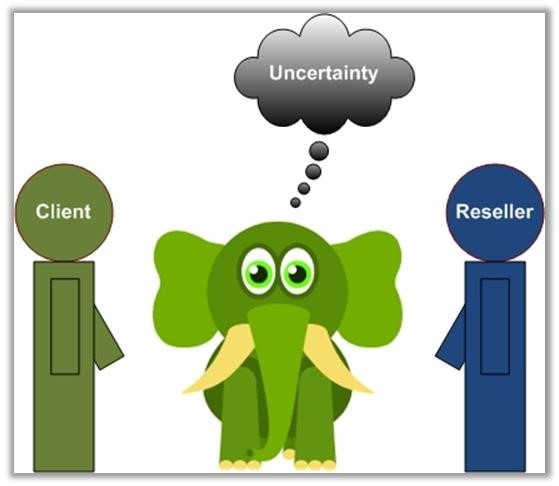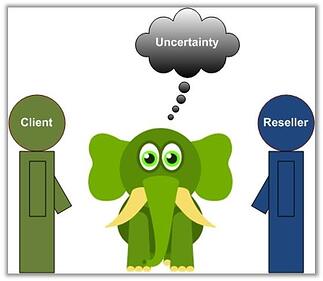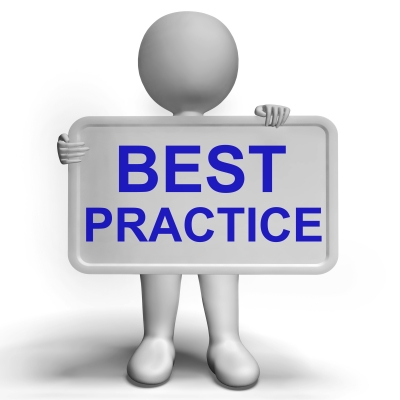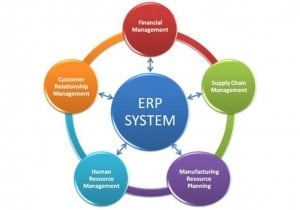ERP Software Consultants Review: Inventory Management Best Practices
ERP Software Inventory Management Best Practices As ERP software consultants working with distribution companies over the past 30 years, we’ve...
5 min read
Walt Goodfield Tue, Feb 24, 2015


Assuming you are involved in a for-profit enterprise, it doesn't really matter what is your particular business or industry. It doesn't really matter what kind of technology you are considering: ERP, HR, CRM, supply chain, project management or any of the other various solutions. Regardless of your business type for functional requirements, there are certain things you ABSOLUTELY MUST know before you buy a new or upgraded ERP software system. Unfortunately, the things YOU REALLY SHOULD KNOW BEFORE YOU BUY are not the same things that many ERP technology vendors and VARs (Value-Added-Resellers or ERP software consultants) want to discuss with you.
Vendors and VARs would like to have you focused mainly on things like ease of use, reliability, reporting, integration and features. Sadly, these are also the same things that most "ERP software selection committees" are thinking about and talking about. However, are these, in fact, the really important matters to be considered?
Allow me to compare some of the standard questions covered in a "ERP software selection" cycle with what I think the really important questions should be:
Typical Questions Asked |
Better Questions to Ask |
|
1. Ease of Use: How many clicks does it take to…?
|
Provide five (5) specific ways your technologies will allow our company to significantly increase Throughput* while holding the line on our Operating Expenses** (including changes to operating expenses that will stem from maintenance and support of your technologies).
|
|
2. Training: What training resources are available to support your technologies, and is there an active online user community?
|
Does the training you provide merely teach our users regarding the technical and functional aspects of your technologies, or will your training also teach our users how to leverage the technology fully given our particular application, industry and circumstances, so that we can maximize Throughput while holding the line on Operating Expenses?
|
|
3. Scalability: Are there significant quantifiable limitations in the use of your technologies as anticipated in our installation (e.g., number of users, database size, bandwidth usage)?
|
If we purchase your technologies, can we expect increases in Operating Expenses or additional Investment requirements in the near future—such as the need to upgrade hardware, operating systems, or other?
|
|
4. Initial Costs: What is the full estimate for our getting started with your technology, including hardware, software, initial maintenance and implementation services? |
Tell us what our anticipated total Investment will be in the new technologies you are proposing, and tell us three (3) concrete ways in which this new technology will help us a) increase Throughput, b) reduce Investment (or demands for future investments), and/or c) slash or hold-the-line on Operating Expenses while supporting significant growth in Throughput.
|
|
|
Given your experience with other customers like us, how much will ongoing maintenance and support from you add to our Operating Expenses on an annual basis
|
|
6. Start-up Cycle: How many hours should be budget internally for the implementation of these new technologies and the related training?
|
Tell us how you will help us minimize lost Throughput in our operations during your implementation and training cycle. Also, tell us how rapidly we might expect to see real and effective increases in Throughput as a result of leveraging the proposed new technologies.
|
|
7. Reliability: What functionality does the software have for detecting and reporting data errors?
|
Please provide us with three (3) references from companies (of a similar size to ours) that have been using your technologies for at least 24 months so that we can create our own estimates relative to time, energy and money we may need to spend in "firefighting" if we invest in the solution you propose.
|
|
8. Reporting: Provide us with a list of standard reports and alerts available out-of-the-box with your technology.
|
Tell us how data gather by or supplied by your proposed technologies can be leveraged by our company to increase
|
|
9. Adaptability: How adaptable are your technologies to support possible changes to our business model or industry?
|
We anticipate that our business model may change from X to Y over the next three to five years. Tell us how your technologies will allow us to adapt to the Y business model and still help us to grow Throughput and minimize Operating Expenses.
|
|
10. Enterprise Application Integration (EAI): How easy is it to integrate with your technologies or, vice-versa, to integration your technologies with our existing enterprise applications?
|
Our goal in every EAI effort is, first, to increase Throughput (while minimizing both Investment and Operating Expenses). Tell us how your technologies will allow us to extend our enterprise for increases in Throughput with a minimum increase in Operating Expenses and/or Investment. Be specific.
|
NOTES:
* Throughput is narrowly defined here as revenues less (only) truly variable expenses.
** Operating Expenses are defined here as all other monies paid out on a regular basis in support of producing Throughput, but not included in truly variable expenses (and not part of an Investment—the acquisition of a tangible asset).
The differences between these two columns of questions for technology vendors could not be more stark in my mind. The questions in the left-hand column are all generic questions leading to generic "rule-of-thumb" answers.
The questions in the right-hand column are all very specific. These questions are focused the technologies' performance in your specific enterprise, under your specific circumstance and seeking specifics to help you and your team create ROI (return on investment) estimates for the project based on potential changes in Throughput, Investment and Operating Expenses.
Can the vendor or reseller do these ROI calculations for you?
No! Nor, should they be expected to.
However, if they are unwilling to help you and your team work through estimates and calculations to the satisfaction of your team then, perhaps, you should be talking to another technology vendor.
Rules of thumb can never do here! Your team of executives and managers need to get comfortable with making "approximately right" estimates for potential changes in Throughput, changes in Investment and changes in Operating Expenses based on what the vendor or reseller can tell you about how to leverage their offering for improvement.
Start asking the right questions—even if they are harder questions to ask.
We would be delighted to hear your thoughts on this topic. Please leave your comments below, or feel free to contact us directly, if you’d prefer. One of our expert ERP business technology experts will be happy to help.
About the Author
Walt Goodfield has spent 20 years in various roles in the ERP market. Currently he is the VP of Sales and Marketing at RKL eSolutions, driving revenue growth through customer acquisition and strategic business partner alliances.
About RKL eSolutions
RKL eSolutions LLC is a technology provider and Sage authorized partner headquartered in Lancaster, PA and with offices in York, PA, Wyomissing, PA, Norwell, MA, Phoenix, AZ, King William, VA, and Cleveland, OH. Our goal is to provide and perfect the design, implementation, and support of advanced information systems that improve our clients’ business operations. We do this by providing consulting services and ERP systems with concentration on financial, distribution, manufacturing and CRM solutions. We provide IT infrastructure services and equipment to your company. In addition, we provide Remote DBA and customer application development on the Windows platform.
RKL eSolutions, LLC offers customized IT services to businesses in a wide variety of industries. As an authorized Sage provider, they implement and support Sage ERP X3, Sage 100 ERP, and Sage 500 ERP solutions. As a Microsoft Certified Gold partner, they also provide sales, installation and mentoring on products like Windows, Hyper‐V, Exchange, Active Directory, SQL Server, SharePoint, Terminal Services, Cisco, and VMware. With offices in Pennsylvania, Massachusetts, Virginia, Arizona, Florida, Ohio, and California, RKL eSolutions provides Sage ERP implementation, training, and support to companies throughout the U.S.

ERP Software Inventory Management Best Practices As ERP software consultants working with distribution companies over the past 30 years, we’ve...

1 min read
ERP Software Consultants Reviews: RF Scanning Guns for Accurate Inventory If you carry inventory in your warehouse operation business, you will...

1 min read
Why Upgrade to an ERP Software System? Imagine you have a string that connects each employee and that string follows them all day long – you’d...